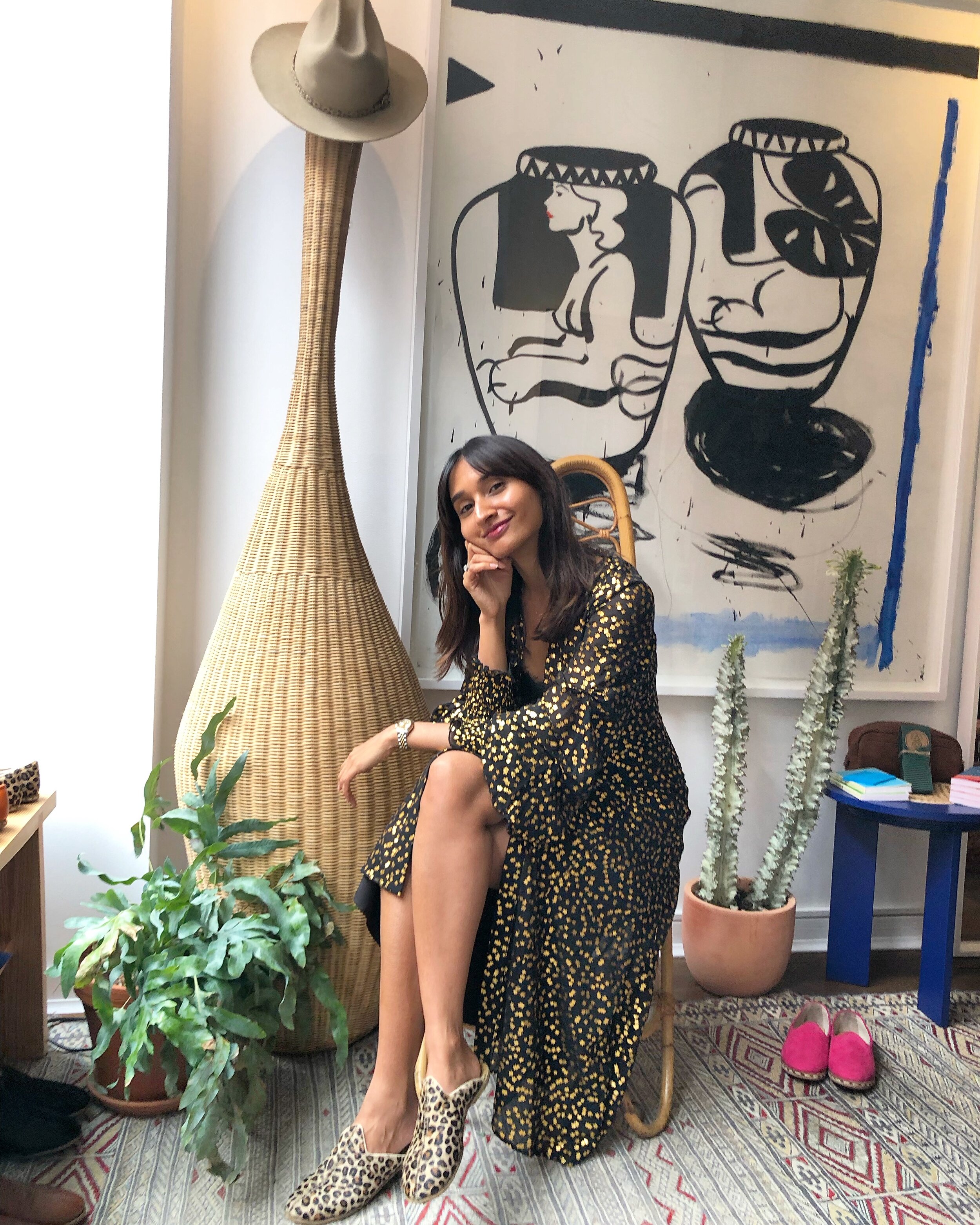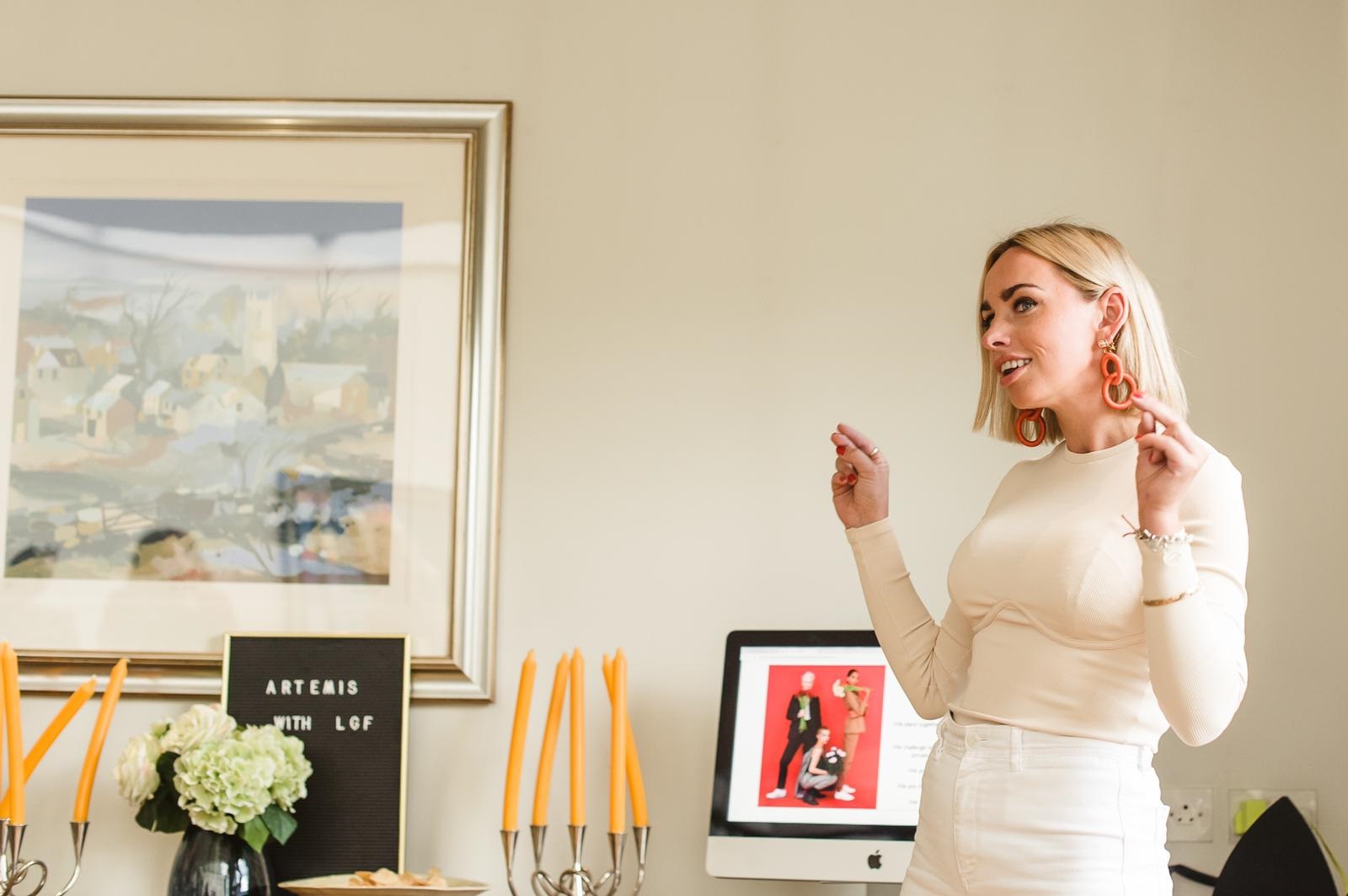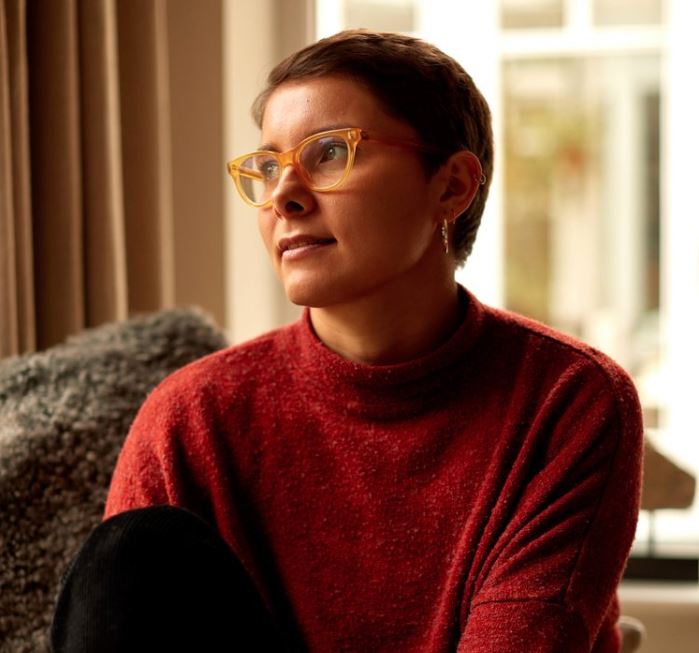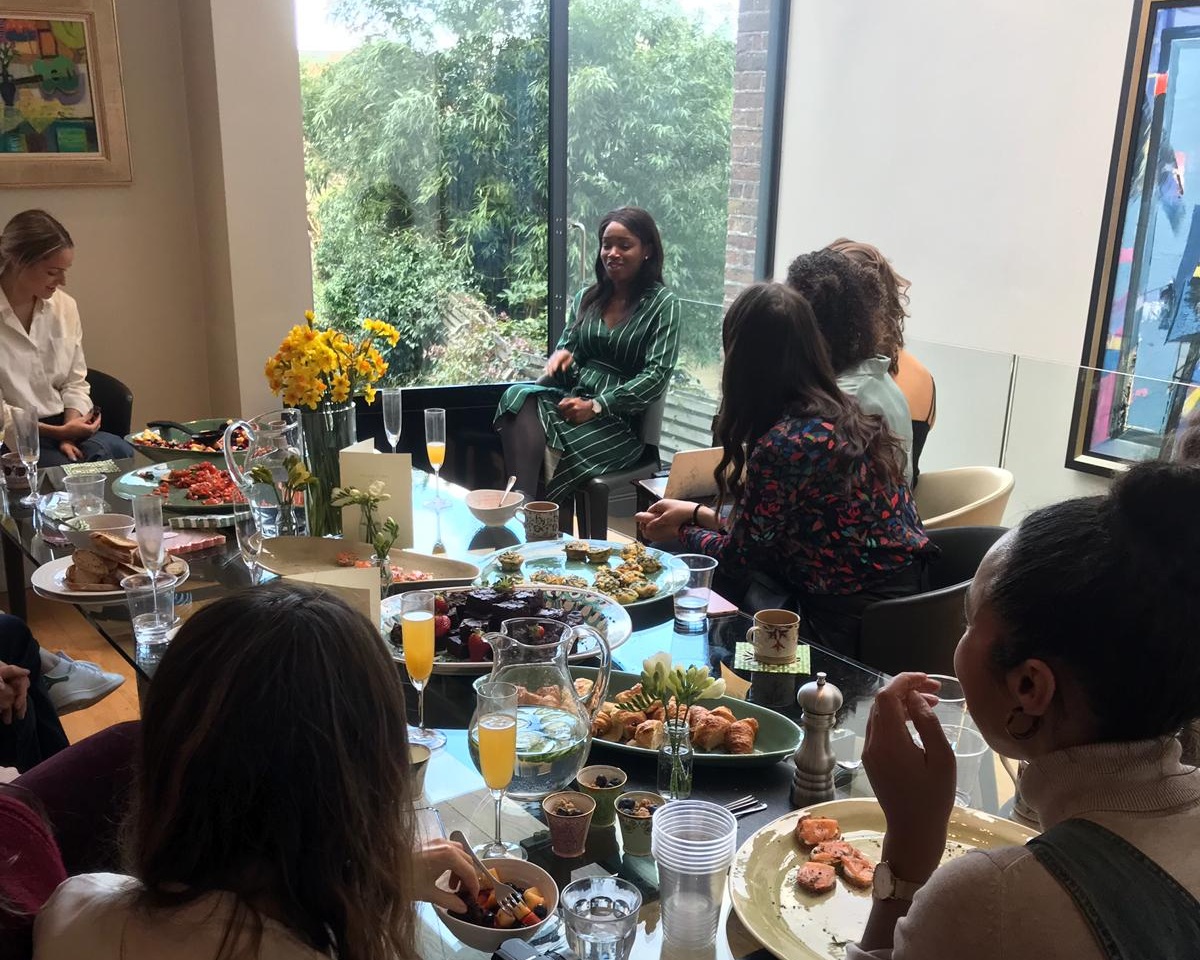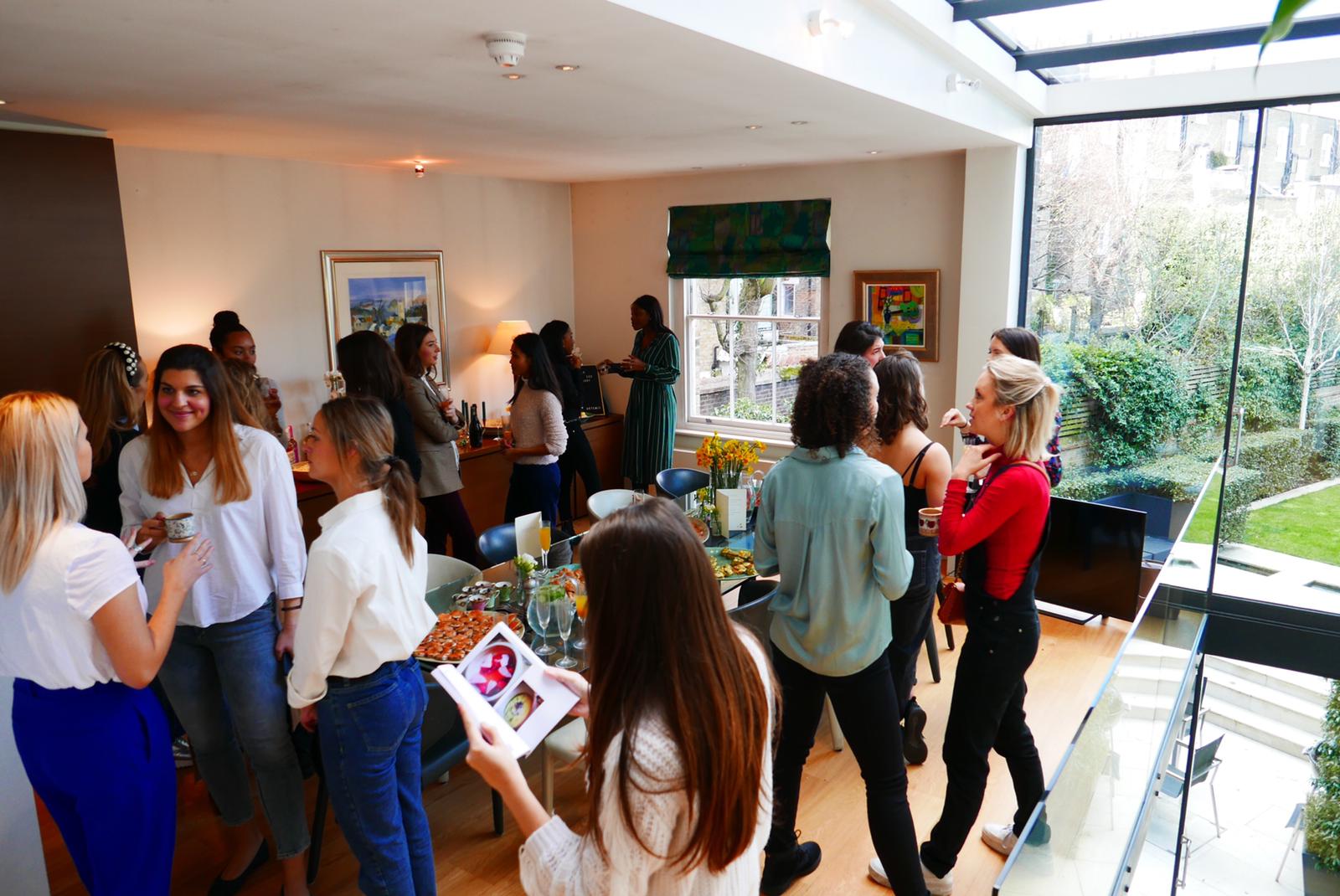The Blog
ARTEMIS ASKS: BY ROTATION FOUNDER, ESHITA KABRA-DAVIES
…about sustainable fashion, renting clothes and community
Eshita is the founder of peer-to-peer fashion rental platform By Rotation.
By Rotation was founded after a trip to your homeland in Rajasthan, India. What was it you saw out there that made you so compelled to start the business?
Garbage pigs! We saw many wild boars on the busy streets of Jaipur eating textile waste. In all seriousness: during my honeymoon I reconnected with my culture and roots while explaining Indian traditions and situations to my English husband. On the last leg of our journey in the Thar desert, I had a revelation, after which my first world problems of wanting a new dress each time a “photo opp” was on the cards felt trite and insignificant. That attitude felt very wrong in my motherland (whose textile labour force continues to be exploited) and I felt guilt, knowing I was part of the problem.
By Rotation is described as the ‘Airbnb’ of fashion. At what point did you realise that people were ready to start renting clothes and to democratise designer fashion?
I was actually discouraged from pursuing this idea by many of those closest to me, but my own market research, coupled with the urgent need to address the problems of our wasteful fashion industry convinced me otherwise. I launched a beta platform in an efficient manner as a proof of concept alongside my full-time job in finance. The platform very quickly gained traction and resulted in By Rotation’s first press coverage in cult-favourite Refinery 29 UK. Getting out there and pursuing my idea was what really enabled me to affirm my gut feeling that owning is overrated, and sharing is to be embraced.
By Rotation is more than just a fashion platform; you’re creating a growing community of vibrant and diverse women. What role does community play in your brand and how can it help us live more sustainably?
Community and sustainability are By Rotation’s core values and the two go hand-in-hand. It’s always said that an organisation takes on the personality of its leader. I’m an extrovert and we’re a direct-to-consumer (-to-consumer!) brand: community is the reason we exist.
Rotators are not just our app users - they are our identity, ambassadors, voice, friends, inspiration, critics, the list goes on… They’re what make us develop and grow together so that we can really improve the way we consume fashion in today’s world. Our regular community events bring together a diverse group of individuals, enabling colourful dialogues that help challenge us to shift our mindset from buying new clothes to the concept of sharing.
P.S.: We are open to all genders!
Where would you like to see By Rotation and your community of Rotators in 5 years time?
In the next 5 years, I see By Rotation as a global and diverse community of Rotators who turn to the platform - not for fast fashion - but each time they’re looking for a “new fashion” fix. By then, we’ll also have a wealth of statistics to prove that rotating your wardrobe does in fact do good for the planet, your wardrobe and wallet at the same time!
Visit https://www.byrotation.com/ to download the rental app and follow @byrotationofficial to keep up with the Rotator community.
ARTEMIS ASKS: PARADISE ROW FOUNDER, NIKA DIAMOND-KRENDEL
…about social enterprise, storytelling and slow fashion
Nika is the founder of East London-based leather goods company, Paradise Row.
What made you leave the world of finance to found your leather goods start-up?
I had moved from management consultancy to work in-house at a bank, at which point my creativity stalled. I applied for a app design competition and won out of hundreds of applicants, including some seniors. At that point, I realised my skills, design and creative ideas were not being utilised enough and it gave me the courage to start a business of my own.
I had read at the same time that the London leather industry was in decline and verging on becoming completely obsolete; at that moment I knew this should be the business and brand purpose - a strong voice to uplift and preserve the industry.
What’s the story behind the Paradise Row brand and its pieces?
Paradise Row is named after a quaint cobbled street in Bethnal Green, where half the road is reminiscent of old London with period buildings and the other half is a symbol of the new, energetic creative London, in which the arches have been converted to restaurants and bars. The brand is the perfect balance between reflecting the London we now know today, and celebrating the city’s leather heritage and cultural history.
The Pearly, one of the bags of the first collection, pays tribute to the Pearly Kings and Queens of East London who have been around for 150 years. The Pearlies are an iconic charitable institution who go round wearing their inherited traditional outfits of suits adorned in pearls to raise money for charities and local hospitals… you can sometimes spot them on Brick Lane.
Storytelling is clearly important for you - how can it influence the way we shop?
Storytelling drives the designs of our collections. Each collection is themed according to an aspect of society - the first collection themed around East End culture, where the brand is born and made. The second collection plays on psychology, on how we can be more empathetic as people. The latest collection speaks to how women are depicted in society throughout art history.
Without reflections on society, I cannot come up with the designs and I feel I have to share that inspiration with my customers. Many customers have actually purchased the bags because they felt the meaning behind them somehow related to their life. Daisy Lowe requested ‘The Boxer’ bag as her grandfather was once a Bethnal Green boxer! Finding connections to our clothes and personal anecdotes for our accessories is a key way to ‘slow fashion down’ and prevent mindless consumption.
The leather industry is often called out as a polluting culprit of the fashion world - how is Paradise Row different?
90% of the world's leather is now chromium tanned leather and, if mismanaged, these chromium salts are damaging to the environment. The vegetable-tanned leather used by Paradise Row is the result of an artisanal method; animal skin (an otherwise wasted by-product of the meat industry) is placed in deep pits, where the naturally-occurring tannic acids in barks, leaves, and fruits like berries convert it to leather over months. This provides a very earthy and natural texture; it’s the most expensive type of leather.
There is a lot of research to be done into even more sustainable processes and materials, but our main focus right now is social impact; helping to rebuild the London leather and textile industries that were hollowed out by cheaper labour abroad. Our brand is totally local; we work with London wholesalers, workshops, employees, graphic designers, photographers - lowering vehicle miles and carbon emissions. We are also avoiding becoming ‘seasonal’ in the typical fashion house sense, having smaller production runs, not producing overstock and wastage that clogs UK landfill.
Find Paradise Row in Fenwick, Fortnum & Mason and The Shop at Bluebird. Follow them at @paradise.row and @nikadiamond_.
ARTEMIS ASKS: THE LADY GARDEN FOUNDATION
…about their mission to change the female health conversation
Emily McDonnell is a freelance brand consultant working with The Lady Garden Foundation.
Why does LGF exist and what sort of work does the foundation do?
The Lady Garden Foundation is a globally renowned charity funding essential research into gynaecological cancers. Founded in 2014 to facilitate groundbreaking advances in the treatment of these cancers at The Royal Marsden NHS Trust, the Lady Garden’s founders - a team of eight amazing women - are determined to help ‘rid the world’ of these devastating conditions. All touched by these cancers (Cervical, Ovarian, Vaginal, Vulva & Womb) in some way, this passionate team is as ambitious as the vision - to not only change the future of female health, but the way we talk about it too.
When LGF started in 2014, surveys showed that 41% of women were too embarrassed to go to the doctor about a gynaecological issue - let alone talk to a friend. LGF felt a change was overdue and now we are on a quest to ditch the 'private' from our 'private parts'.
How can we support our female friends and family, and end the taboo surrounding women's sexual health?
Language is really important. Start talking about vaginas, loud and proud. Be open-minded and supportive - take away the embarrassment and shame around gynae health. If enough of us do this, it will start to surface in culture, and for businesses engaged in social listening. No longer will Facebook and other global platforms be able to ban ads or gynae-health-related content in a way that reinforces embarrassment or shame about something so critical and natural. Why should penises and male sexual health get all the airtime?
How can we educate ourselves about our bodies, and what should we be looking out for/mindful of?
Start talking about it with your friends - you will most likely find out that we all do have the same questions and have gone through similar things. Encourage your friends to make sure that they do go and get a smear test. Remember that smear tests only screen for one of five types of cancer (cervical); blood tests can screen for others.
Get familiar with your own body - be curious. Educate yourself by reading articles written about gynae health online, start following leading gynaecologists on Instagram as they usually share their latest research and tips. YouTube is also a great learning tool.
Gynaecological cancers are known as silent killers so the more we talk about it the better we stand to making these silent killers. #SilentNoMore.
Click to find out more about The Lady Garden Foundation, or Emily McDonnell’s work.
ARTEMIS ASKS: VIDA CARMEL
…about Neuro Linguistic Programming, powerful self-talk and what it takes to say ‘no’
Vida is a Neuro Linguistic Programming Master Practitioner.
We’re new to NLP - how would you describe your practice in a sentence?
Neuro Linguistic Programming is an outcome-focused model, based on how our minds (neuro) and communication (linguistic) interact with each other - by focusing on our patterns of behaviours and beliefs (programming) we can get different results.
How has the power of NLP amazed you in the past?
To witness people who have been through traumatic events drastically reframe their experience and belief in what is possible is amazing. To see someone's physiology and state entirely transform and to know that these people have been able to sustain this change and create positive outcomes for themselves for years since working together is just incredible.
What are some simple things that we can do today to start changing our own language and behaviours?
We are all free to create our own future, which is incredibly exciting because the possibilities are limitless. When you realise you have agency and the ability to choose how to respond to the world you will notice how different life can be. Next time you find yourself focusing your attention on anything negative, ask yourself, 'what do I want instead?' Keep going until you are able to state this using positive language. This way you will show yourself how to reframe your experience towards a positive outcome.
Find out more about Vida and her work here.
READ ABOUT ARTEMIS IN METRO ONLINE
by Natalie Morris
ARTEMIS ASKS: CHANTIE COX-GEORGE
…about sex robots, A&E and bringing your body to work as a woman
Chantie is a Junior Doctor-turned-Management Consultant.
Who is the most important female role model to you?
My mum has shown me what it means to be a committed and determined woman; to rise to every challenge. We have such different personalities but I wouldn’t be half the woman I am today without her grit and perseverance.
What’s the biggest challenge women face in bringing their bodies to work?
I think women are being more vocal than ever when we are treated differently at work purely because we are women; how we’re represented in media often seeps into everyone’s professional psyche, too. I think there’s still a lot of work to do because until we see women - and not just cis-gendered, able-bodied, middle-class, caucasian women - at the top of the organisations in which we work, we will continue to face many challenges in the workplace.
You were the first woman to conduct an academic investigation into sex robots… what’s so significant about the evolution of that market?
The industry is growing and is ethically contentious. In 2018, I wrote a paper for a medical journal which concluded that there are no proven therapeutic benefits to the ownership/use of sex robots - a great deal more research into ‘robotiquette’ (human-robot relationships) is necessary as we move further into the AI age.
What’s one change you’d like to see in the medical profession?
What unites us all in the medical profession is our commitment to putting the care of our patients first. I would like to see us work on how we practice kindness towards one another, reminding ourselves that although we are providers of care but also human beings who need, and deserve, our own dose of kindness, too.
Read Chantie’s article here.
ARTEMIS ASKS: jESS RUBEN
…about founding start-ups, failing in start-ups and building resilience
Jess is VP of Business Operations at Judopay.
Why is failure important?
Because your reaction to failure is what separates the good from the great!
What’s the biggest realisation you’ve had through your entrepreneurial failures, and successes?
That to be my best at work, I need to give less. Re-balancing life and work has made me more productive, more able to cope with challenges, and made me a better teammate and manager.
And how did you figure out what out what really motivates you?
I’m a big believer in allowing yourself time to process. Whenever I feel something strongly, be it happy or sad, I give myself the opportunity to reflect. Processing works best for me when I write, so I always have a pocket-size notebook for my reflections on the go. I also have a private blog on Wordpress where I’ve been writing for the last four years; even if I don’t realise it at the time, I look back through my notes and see themes that have helped me learn about myself.


